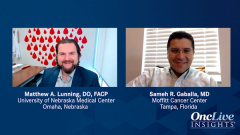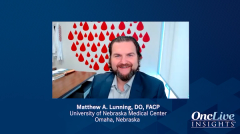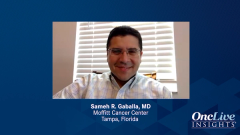
Relapsed/Refractory Follicular Lymphoma: EZH2- and PIK3-Targeted Therapies
A brief discussion on the respective roles of EZH2- and PI3K-targeted therapies in patients with relapsed/refractory follicular lymphoma.
Episodes in this series

Transcript:
Sameh R. Gaballa, MD: Having talked about the different options and the relapsed/refractory setting, we now have CAR [chimeric antigen receptor] T-cell therapy, we have bispecific antibodies. Copanlisib is still available. [The] PI3-kinase inhibitor tazemetostat is available, which is an oral therapy. So could you elaborate a little bit more about which patient profiles would fit in tazemetostat? Are we looking here for efficacy or safety? Do you look at the EZH2 mutational status? There’s also been recently a comparison—a propensity score matching of the patients in the trial [who had EZH2 mutations] versus EZH2 wild type. Because, as you remember, the problem with the study was that the patients on the mutant arm or the EZH2-mutant arm were very different, and then [there were] those who were easy to wild type. Could you give us your thoughts in a nutshell?
Matthew A. Lunning, DO, FACP: I think that tazemetostat certainly is an option in follicular lymphoma. It’s just finding the right patient in the right situation where that drug can be used. I personally see tazemetostat as a drug that you would be using when you’re trying to gain confidence in a patient who’s coming off a prior regimen that you thought was going to work in follicular lymphoma, but they had intolerance or an adverse event that led to the withdrawal, yet they still need another line of therapy next. I think that’s the advantage of tazemetostat, its toxicity profile is there, and it does have the potential for not only efficacy but durability, if efficacy is seen. I agree with you with the match, with the propensity analysis.
It really, again, is what drove me to maybe stop checking for EZH2 mutational status, because if I’m going to use the drug, I’m going to use the drug, but we are going to watch. I think you have to watch out for dysgeusia with tazemetostat, asking them how [they are] eating, and monitoring…quality of life issues. Because it is a population, like I said, that where I’m kind of dipping my toe into the rituximab isn’t working anymore as a monotherapy, but your follicular lymphoma needs treatment because it’s impacting your quality of life. But I do think it’s that therapy, but I also think it is a [variable] regimen. So I think that it is something that can be combined with other agents. Is it going to be the main course? Probably not, but it’s a good dessert to the regimen. Sometimes dessert still can taste good and can be impactful to the disease durability, so I see it as a drug that not only can be used commercially, but also in the clinical trial realm, perhaps as a maintenance therapy or after a bolus of a lead-in, whether or not that’s bispecifics, [lenalidomide-rituximab], so on, and so forth.
Sameh R. Gaballa, MD: Previously in terms of patients who require, who’ve asked for oral therapies for different reasons, we had some of the PI3K [PI3-kinase] inhibitors in this setting, although the toxicity was a concern. But now, most of the PI3K inhibitors are not available; the only PI3K inhibitor for follicular lymphoma that’s still available would be copanlisib. Although [there was] the copanlisib-rituximab trial, the company’s not moving forward with trying to get it approved. It may change in the future, but I think one of the issues with the PI3K inhibitor class as a [whole] was toxicity. We’re seeing some autoimmune manifestations, colitis, pneumonitis. Some of them were intravenous, like copanlisib, for example. They were having some issues with hyperglycemia or hypertension. So I think a lot of patients at this time are either thinking of bispecific antibodies, CAR T-cell therapy, tazemetostat, or, if they’ve not seen rituximab-lenalidomide previously, that’s still obviously one of the options.
Transcript edited for clarity.







































